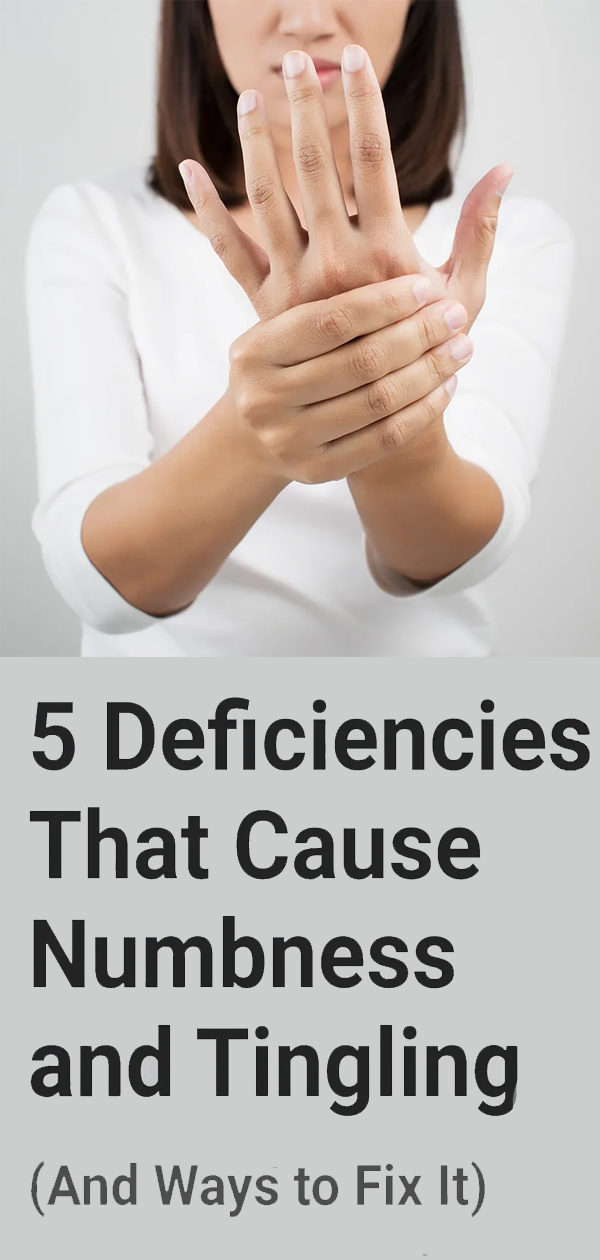“What the HECK is peripheral neuropathy (per-if-er-ul) neuropathy (nur-op-uh-thee)?” Have you ever heard the saying “pins and needles” or felt the sensation of numbness and tingling?
Well, peripheral neuropathy is the long-term variety of numbness or tingling, but what about short-term? (Like say running your funny bone into your desk?) Unfortunately, our science friends don’t simplify the name of this condition either, choosing instead to call it paresthesia (pear-is-thee-see-uh).
The symptoms of paresthesia include:
- Aching or burning pain
- Sensations of a part of the body “falling asleep”
- Pins and needles
- Numbness
- Tingling
- Skin that feels hot or cold
- Stabbing pain (Chronic paresthesia)
Now let’s talk about some of the nutrient deficiencies that may cause one or more of the above symptoms – primarily, numbness and tingling.
5 Deficiencies That Cause Numbness And Tingling
“Peripheral neuropathy may occur as a result of malnutrition, of which there are many causes including poor nutrition caused by unbalanced diet and alcoholism.” – The Foundation for Peripheral Neuropathy
1. Calcium:
The body does not produce calcium, so we must obtain it via food and supplements. Calcium is critical for our health and well-being. Besides keeping the bones healthy and protected, calcium also supports heart, blood, and muscle health. We lose amounts of this mineral through sweat, urine, and feces. And wouldn’t you know it, numbness and tingling are two of the most commonly reported symptoms of low calcium.
How To Fix It:
Dairy products – for example, cheese, milk, and yogurt – are outstanding sources of calcium. However, plenty of other non-dairy foods are rich in the mineral. Soymilk, fortified cereals, bottled water, and breads are all good sources. You can find plenty of quality calcium supplements on the market, as well.
2. Magnesium:
Magnesium is involved in over 300 chemical reactions of the body, including the heart’s functions, muscles, and even hormones. As magnesium deficiency is known to disrupt nerve function, a shortage of the nutrient can lead to symptoms such as tingling and numbness.
How To Fix It:
It is estimated that only about 25 percent of U.S. adults get enough “Mg” in their diets. Good dietary sources of magnesium include cooked spinach, legumes, and pumpkin seeds. Supplements do suffice, though it is recommended not to take more than 350 non-dietary milligrams of magnesium daily. It is also worth mentioning that excess alcohol, caffeine, and soda speed up the loss of magnesium through kidney excretion.
3. Vitamin D:
Not getting enough vitamin D disrupts our body’s absorption of dietary calcium. Calcium, of course, is essential to bone health. These problems may also spread to areas of the extremities, including the muscles, which may take on a feeling of numbness or tingling. Vitamin D deficiencies may also produce symptoms such as fatigue, loss of appetite, weight loss, and constipation.
How To Fix It:
Sunshine is the best source of vitamin D. Cereals, milk, and soy products are good dietary forms of D. Supplements should be a last resort, however, as even minimal exposure to the sun combined with a well-balanced diet should do the trick.
4. Vitamin B12:
B-12 deficiency can produce symptoms such as depression, delusions, and memory loss. Physically, low B-12 levels can cause numbness and tingling, along with jaundice, joint pain, and a shortage of breath. B-12 is necessary for a multitude of functions, including the production of DNA, nerves, and cells.
How To Fix It:
B-12 deficiency arises from one of two things: nutritional habits or an inability to absorb the nutrient. Further, plants do not produce the vitamin, placing vegetarians and vegans more at risk. Regardless, the solution depends on the degree of severity. Mild deficiencies may be corrected with a simple multivitamin; serious deficiencies may require high-dose B12 tablets or some other treatment.
5. Vitamin E:
As a potent antioxidant, vitamin E safeguards body tissue from free radicals. Aside from cellular protection, or perhaps because of it, “E” is known for its anti-aging properties. Vitamin E helps protects the nervous system. When the body has a low amount of usable E, we may experience numbness or tingling sensations in the hands, feet, and toes.
How To Fix It:
Good sources of vitamin E includes broccoli, kiwi, mangoes, nuts and seeds (especially sunflower), tomatoes, and vegetable-based oils. Vitamin E supplements are generally regarded as safe. If you are pregnant, seek the advice of your doctor. High levels of vitamin E may pose a threat to the health of an unborn baby.
Final Thought: The Essential Nature Of Proper Nutrition
The unfortunate fact is that far too many people are nutrient-deficient. This exists despite the fact that most of us are fortunate enough to live in an environment which provides an abundance of options – relatively inexpensive options – for getting proper nutrition. Not only does a well-balanced diet help us feel better, but it can also can effectively fight off many of the conditions that plague us, including cancer, diabetes, heart disease, and obesity.
In many ways, numbness and tingling sensations are a manifestation of poor health. Subsequently, poor health is too often the result of bad dietary choices and lack of physical activity. Indeed, improving upon these two lifestyle factors can make all the difference!


